For Muslims, reciting the Quran with tajweed and proper Makharij is an important part of connecting with the words of Allah SWT. However, mastering the beautiful art of Quran recitation with 7 Maqamat takes time, patience, and learning. An emerging field that more Muslims are exploring to beautify their recitation is studying the maqamat course of the Quran.
What are 7 Maqamat?
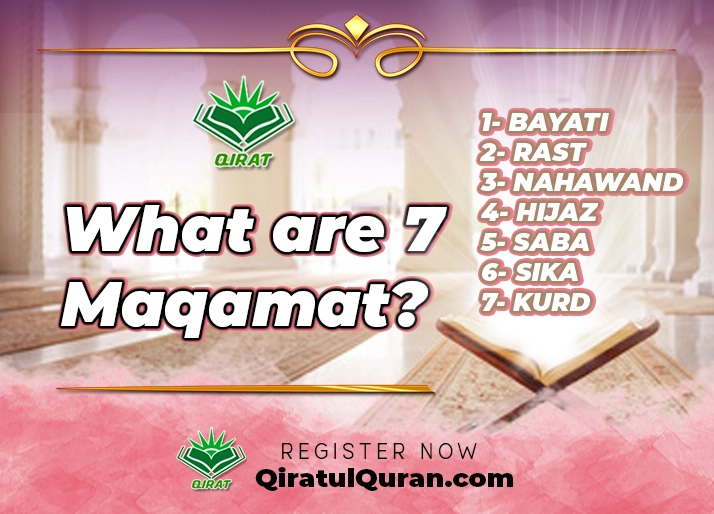
Maqamat (singular: maqam) refers to the melodic modes of Arabic music that classical Muslim scholars have identified and named based on the tone and mood it evokes. There are over 100 different maqams but some are more commonly applied to Quranic recitation. Therefore, Learning these can help you recite in a more melodious, pleasant, and moving manner. Some benefits of learning the Quran Recitation with 7 maqamat include:
Elevating Spirituality Through Melody
The maqamat helps connect the meaning and message of the verses through unique melodies and tones. Reciting verses of promise and paradise in a hopeful, optimistic maqam, for example, helps one feel and reflect on the meaning better. It elevates the spiritual experience beyond just reciting words correctly.
Memorization and Recall
Linking verses to distinct beautiful melodies also helps with memorizing longer passages and chapters. The extra-musical associations act as cues when recalling verses during recitation.
Appreciation for the Depth of the Quran
Mastering the maqamat showcases the depth, musicality, and richness underlying Quranic recitation that a simple reading of the text may not reveal. It leads to a greater appreciation of the multilayered meanings and messages woven throughout.
An Introduction to 7 Quranic Maqamat
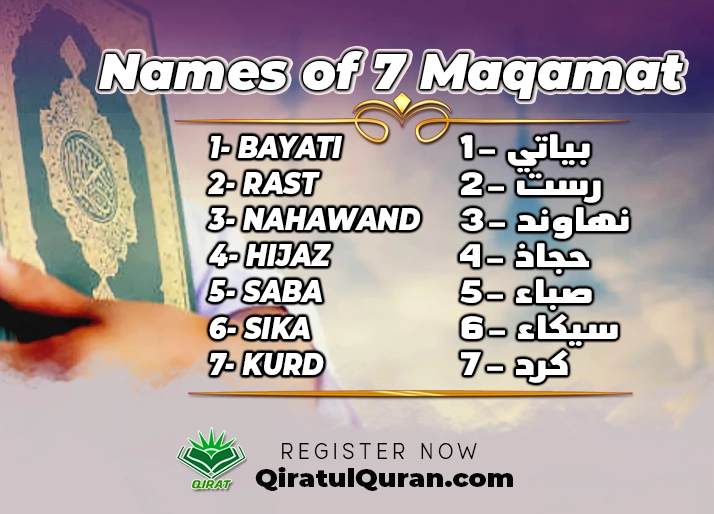
Some characteristics of maqams applied in Quranic recitation with Maqamat include:
1- Bayati
Evokes spiritual tranquility and patience. Applied frequently in reciting longer chapters focused on storytelling.
2- Rast
A vibrant maqam that captures the majesty and powerful moments, used often when reciting verses on the grandeur of Allah and scenes from the day of judgment.
3- Hijaz
Meaning “separation” in Arabic, this maqam captures sadness and pain especially when reciting verses on loss, difficulty, or the challenges faced by prophets.
4- Saba
A deeper, somber-sounding maqam is used for topics related to warnings, wisdom, and reflections reminding us of the deeper meaning of events.
5- Sika
One of the most versatile maqamat, sikah balances joy and contemplation. It is a foundational maqam for beginners to start with before exploring more complex tunes. Sikah brings lightness and optimism when applying it to verses on Allah’s blessings or the wonders of paradise.
6- Nahawand
This maqam captures extreme grief and tragedy through somber yet beautiful melodies. Skilled reciters use it specifically when intoning passages recounting the severe trials faced by prophets or scenes from judgment day that underscore loss and distress.
7- Kurd
Bright and spiritual is the hallmark of this uplifting maqam. The cheerful personality of Kurds makes it apt for verses on Allah’s mercy, scenes depicting heaven, or positive relations between believers. Its flowing melodies inspire deep satisfaction and serenity.
These represent just a sample as there are many more maqams each with their distinctive personality and mood for connecting meanings.
Finding a Qualified in 7 Maqamat Teacher
For Muslims new to studying 7 maqamat or who already have a basic foundation in Quranic recitation, finding a qualified teacher is key to progressing further. Some things to look for include:
Years of Specialized Training
Look for a teacher with many years of dedicated training under a master of seven maqamat, not just general recitation experience. Memorizing 7 maqams takes in-depth practice.
Mastery of Multiple Maqam
Find a teacher fluent in applying various maqam fluidly to different passages not just 1 or 2, showing their depth and capability.
Emotional Resonance in Recitation
A top teacher should recite with an emotional resonance that moves listeners and connects them to the meaning in a deeper, more personal way.
Adaptive and Encouraging Style
They should also be able to teach in a flexible, personalized way based on your background and challenges, with plenty of encouragement.
Investing in lessons from a qualified maqamat teacher is the safest way for new students to develop their skills effectively versus trying to teach themselves. Self-learning without a guide can lead to adopting melodies incorrectly or superficially.
Overview of Qiratul Quran’s 7 Maqamat Programme
A popular contemporary maqamat program receiving interest from students globally is the 7 Maqamat Quran course developed by Qiratul Quran.
About Qiratul Quran
Qiratul Quran is an international Quran teaching institute from the United Kingdom & Egypt with over 30 years of experience specializing in maqamat techniques. Its instructors hold multiple high-level certifications and have mastered all 100+ maqams, becoming experts at integrating them seamlessly into Quranic recitation.
Our 10,000+ Students of Maqamat Classes Online
Over 10,000+ students from over 10+ countries have attended Qiratul Quran’s maqamat workshops when they travel on tour as well as virtually through their Quran Academy online platform. Hundreds have completed their comprehensive certification program to formally qualify as teachers themselves like Imams of the Mosque.
Their Teaching Approach
Qiratul Quran has cultivated a structured yet flexible approach for both beginners as well as intermediate students seeking to specialize in this field. Some highlights include:
- Customized Learning Pathway: Students receive personalized guidance based on their entry skills, weaknesses, and strengths with a roadmap to progress from basic tajweed to advanced maqamat technique.
- Emotional Connection Emphasis: Instructors focus on helping students evoke deeper emotional resonance and meaning with each maqam, not just memorize mechanical melodies.
- Comprehensive Reference Material: Students have lifetime access to the Maqamopedia archive detailing characteristics of 125+ maqams to supplement practical sessions.
By investing time in Qiratul Quran’s program, students from across the world have been able to successfully unlock it. The more beauty, meaning, and personal connection with Quran recitation with 7 Maqamat of the Quran.
The Deep Impact of the Maqamat Study
For lifelong students on the path of better connecting with Allah’s words and message. Exploring the maqams with qualified experts like those at Qiratul Quran can have profound effects.
Achieving Near Mystical States
Accounts across history and from modern students describe entering heightened states of focus. And ecstasy while applying certain maqams for longer recitations, from the profound essence they unlock.
Inspiring Others in Faith
The melodious style naturally captures the attention and interest of non-Muslim listeners. And allowing them to also appreciate the linguistic beauty underlying Quranic Arabic.
Strengthening Love for the Quran
Mastering the maqams shows how layers of musicality underpin the Quranic text. which leads to greater awe, appreciation, and love for wanting to continually recite and connect through it.
Though introducing Quran recitation with 7 maqamat seems intimidating at first, credible teachers. Therefore, institutes like Qiratul Quran break down accessing and applying this central tradition in easy stages of 7 Maqamat. Exploring these melodies ultimately gives students a pathway for unlocking even greater beauty, meaning, and closeness through reciting Allah’s words for a lifetime.
Frequently Asked Questions
How many maqamat are there?
There are seven primary maqamat scales used for Quran recitation. These are Rast, Bayat, Hijaz, Sika, Saba, Nahawand, and Kurd. Expert maqamat mastery involves learning unique rules and techniques associated with each.
What are some key maqamat vocal techniques?
Some examples are tafkheem (softening consonants), imalah (bending notes), qufl (closing lips to amplify resonance), tahleel (trilling notes), tanjeem (modulating pitch between passages), tarannum (extending vowels), etc.
Do I need a musical background to learn maqamat?
Not necessarily. While beneficial for developing pitch/rhythm skills, the techniques utilize the speaking voice. With step-by-step guidance, those without musical experience can learn proper sound production and ornamentation following structured exercises.
How is maqamat different from tajweed?
Tajweed defines the articulation and pronunciation of Quranic alphabets during recitation. Maqamat builds upon tajweed fluency by teaching vocal methods for embellishing passages with precise musicality, intonation shifts, and other performance elements.
Which verses do we practice maqamat with?
Lessons utilize established training passages like Al-Baqarah 1-5, Yusuf 1-5, Al Nas, and Al Falaq to master sound application. Advanced students progress towards beautifying longer surahs like Al-Kahfi, Ar Rahman, etc. with diverse maqamat.

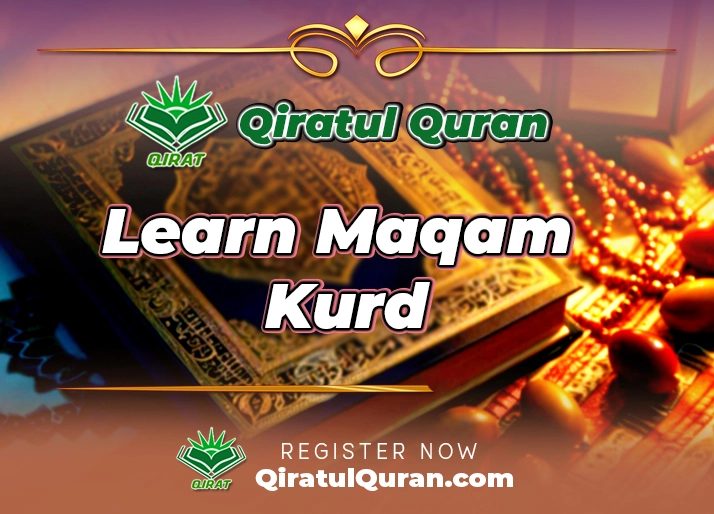
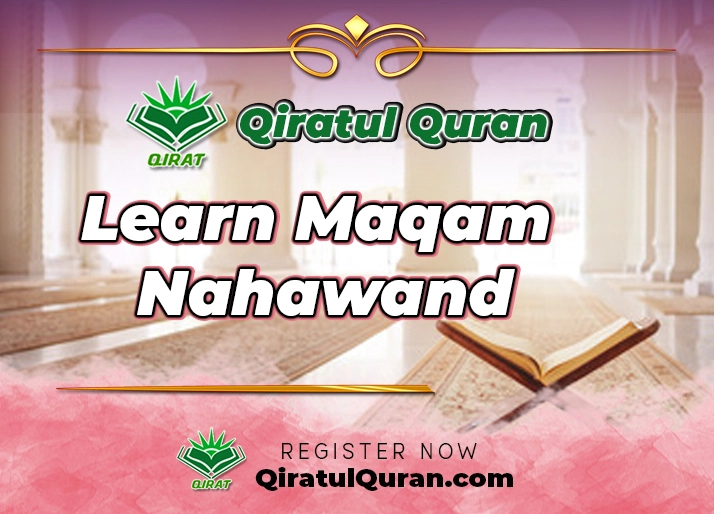
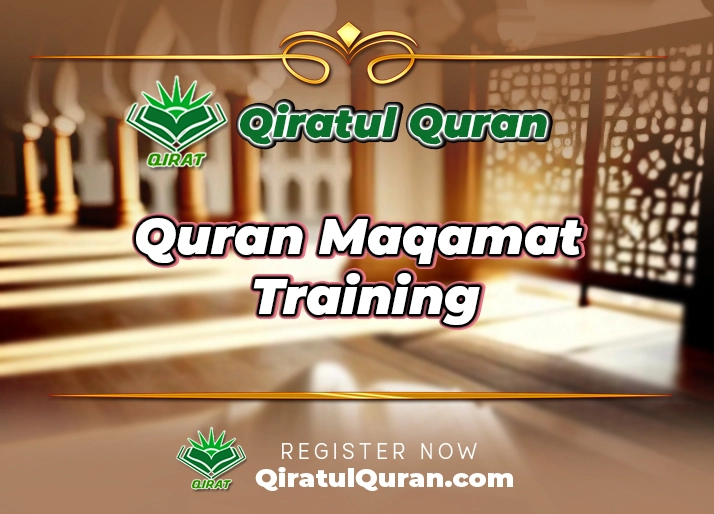


Pingback: Learn Maqamat Quran Online - Qiratul Quran | Enroll Today